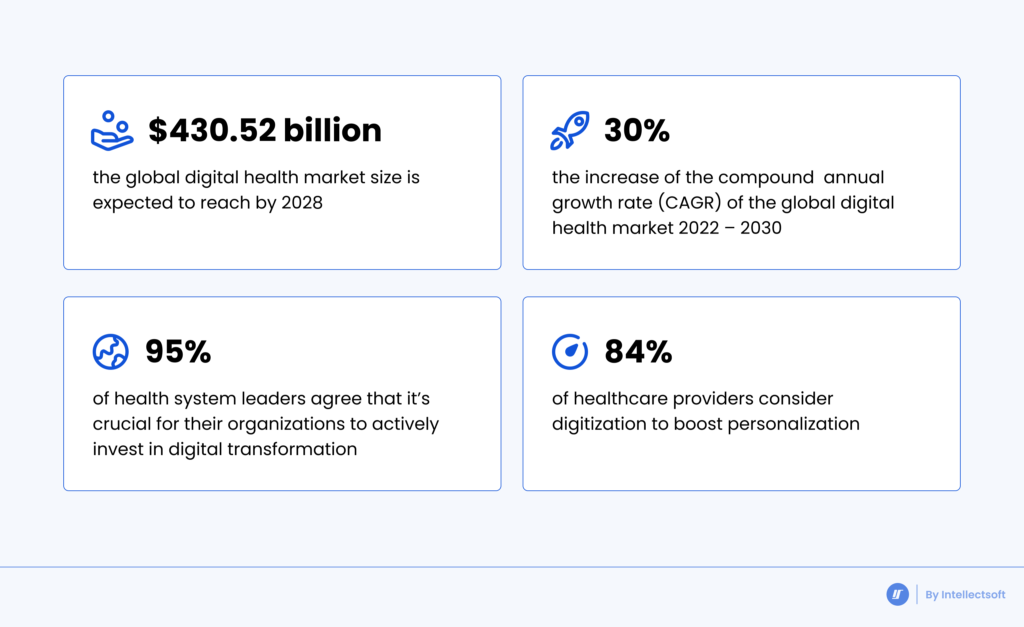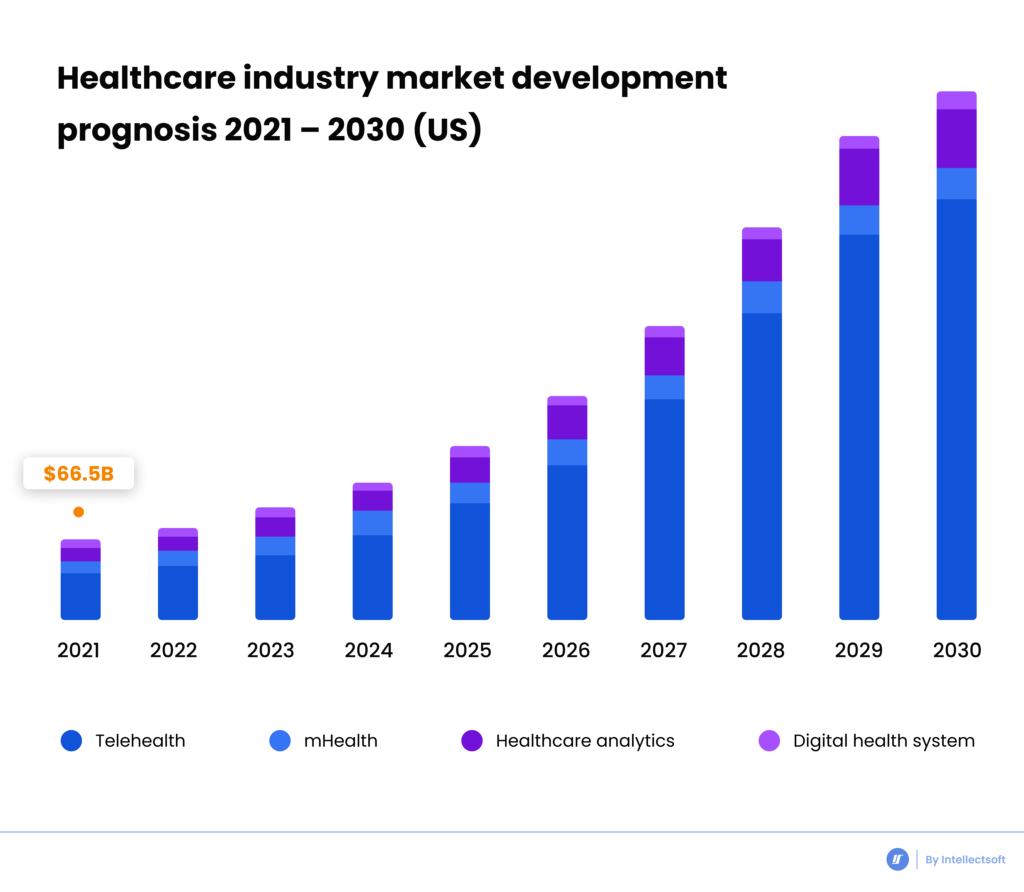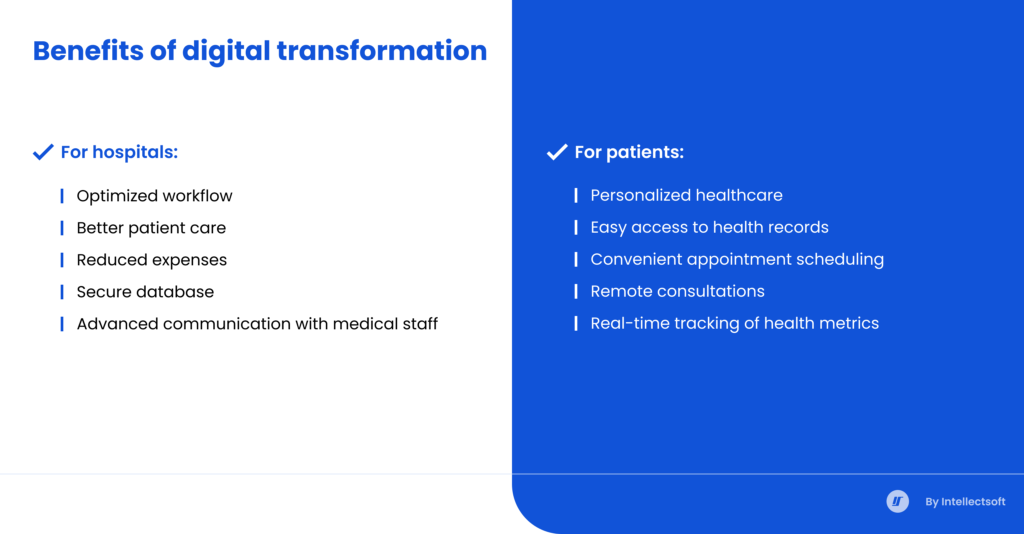
Digital transformation has a huge impact on the performance of nearly all industries, and healthcare is not an exception. Nowadays, it’s integral for the healthcare industry to provide better patient care digitally no matter where they are. Generally speaking, digital transformation in the healthcare market is all about adopting innovative technologies that are aimed at improving work efficiency in hospitals as well as taking patient care to a whole new level.
In fact, more and more different opportunities appear today in the branch of digital transformation in the healthcare industry and in diagnostics.
Why digital healthcare is important, what benefits it can bring for the health industry and its consumers, and what future digital trends should we expect there? In this article, we’ll get it covered.
But before we proceed, let’s define what exactly digitalization in the medical field means.
Digital transformation in healthcare is a completely new way of delivering care while ameliorating the internal hospital processes and, most importantly, meeting all needs of patients through embracing and implementing advanced technologies. It’s the active use of technologies to bring value to people and healthcare organizations to maximize benefits.
The research by Deloitte demonstrated that around 92% of healthcare units expect to achieve better performance from the patient-centric business development model.

Therefore, the digital healthcare transformation has forced radical changes in medical services. So, let’s now review the healthcare business transformation and take a closer look at real examples of digital transformation in healthcare.
Use Cases of Digital Healthcare Solutions
So, digital transformation in healthcare makes a detailed overview of how the medical units diagnose, monitor, and manage patient health. Its main goal is to implement innovative healthcare IT solutions to optimize the major workflow processes and compliances, and improve patient service while reducing costs.
For this purpose, let’s now take a look at how digital healthcare is already used in medicine.
1. Automation
Nothing is more powerful than automation for the healthcare industry. It’s worth noting that its implementation is very beneficial for drug manufacturers and especially for production safety. Technologies enable very accurate and detailed examination of materials. Automation algorithms can come in handy for microbiological studies where they can boost the efficiency of studies, analyze and assess specimens while improving the outcome of the laboratory research.
And it goes without saying that its advantages for healthcare services are immense. Automation enables employees to minimize paperwork while reducing human error and maximizing work productivity across departments.
For doctors, it means having more time at work they can spend on communicating with patients and providing even better and more personalized care. Also, automation enables us to take care of larger groups of patients with similar needs and save time on an individualized approach. Those patients can also receive automated appointment reminders that will minimize no-shows at hospitals.
2. Connected Ambulance
A connected ambulance serves as an assistant to healthcare providers as it collects and transfers all vital patient data that can be gathered through wearables, sensors, and HD cameras, and sends it to the hospital while the patient is being transported to the required department.
Even before the patient arrives at the hospital, doctors will already have all the required data that will help them provide the needed procedures faster and more effectively without losing priceless time. In some particular cases, doctors can also guide paramedics through certain procedures with the help of connected ambulance technology.
3. On-Demand Healthcare Solutions
During the past decade, society has become more mobile, which makes more and more organizations keep abreast of cutting-edge technologies, especially those from the healthcare field. Instead of tethering themselves to one company, professionals become more eager to work for multiple medical facilities at a time.
For this purpose, the Nomad Health company has launched a platform that links doctors directly with the healthcare units for short-term work.
It enables physicians to provide the so-called “on-demand” medical services to the patients, and only if it matches their expertise, experience, and working schedule. Thus, doctors become more flexible in offering medical services, and can effectively adapt to the patient’s evolving needs.

4. Telemedicine & Virtual Visits
One of the most notable changes in healthcare is the growth of virtual doctor visits. It enables meeting the specialists at the most comfortable time and from nearly anywhere, which is much more time and cost-efficient rather than an in-person hospital visit.
Based on the research, around 83% of surveyed patients are ready to use telemedicine, which has become even more popular after the COVID-19 pandemic outbreak in 2020.
This digital transformation strategy has been already used in the Brigham Health hospital network (Massachusetts, USA), where the patients can use virtual visits on a regular basis.
They can schedule appointments, communicate with doctors via video chats using phones or PCs, receive detailed prescriptions in their emails, and more.
Due to the Brigham Health recent survey, more than 74% of patients feel the virtual visits positively impacted their interaction with their doctors and healthcare institutions as well.
5. Patient Portals
Another great trend in the transformation healthcare solutions feature is creating specific healthcare platforms where the patients can:
- Review their health records
- Check prescriptions
- Schedule appointments with the specialists
- Ask for a consultation or get additional information from their doctors
- Receive the laboratory results
- Share their health data with the healthcare provider
And that’s only a few options available on the healthcare platforms for patients. At the same time, this system enables quicker and more convenient access to electronic health records and significantly reduces the burden for the medical staff.
A great example of patient portal technology use is the FollowMyHealth system. It covers the most essential features we’ve already introduced above and also can be used by the doctors of general medicine and those of more specific healthcare areas.
However, this digital innovation in healthcare is still in its early stages of use. According to the patient surveys, over 40% of participants say that these systems are still too confusing, and their interface features are difficult to interpret and use.
6. Health Wearables
At present, people have become more conscious about their health: they’re not visiting a doctor when they get sick, instead, they’re always looking for effective yet convenient ways to track their health metrics.
Basically, that was the main reason why we’ve seen a tremendous increase in the sales of wearable medical devices. The digital transformation in healthcare enables tracking the various health metrics and providing accurate health data in real-time. Some of the common types of health devices include:
- Heart rate trackers
- Exercise & fit (duration, type of activity, distance, calories burnt, etc)
- Sweat meters (for tracking blood sugar - an essential routine of diabetics)
- Oximeters (for monitoring the oxygen carried in the blood - used for the patients with COPD, asthma, severe cases of COVID-19, and other respiratory illnesses)
One of the most popular wearables introduced on the device market is Apple Watch. The smartwatch was first released on September 9, 2014, and so far can track heart rate and exercise, reminders about drinking water or washing hands, used for recording body temperature, weight, and periods. This data, in turn, can be later used by doctors for analyzing health metrics, diagnosis, and more.
7. Disease History Analysis
Nowadays there are more and more tools that analyze a patient's disease history in order to give doctors recommendations about treatment outcomes. An example of such a solution is the company BostonGene. The BostonGene's algorithm conducts a profound analysis of a patient's previous conditions and offers a personalized treatment plan that would potentially deem the best results.
Benefits Of Digital Transformation in Healthcare
In fact, medical digital transformation provides plenty of benefits for all the patients involved, as well as the medical institutions they’re been used by.
With these innovations used, physicians and hospitals can speed up their workflow, get more accurate patient data and health metrics, and build up a more effective treatment in a shorter time. All these factors can significantly impact the outcome, of course, for the better.
After you know the most popular and up-to-date technologies and trends implemented nowadays, it’s time to briefly review what benefits they can bring to the healthcare enterprises and their patients correspondingly.

Advantages of Digital Transformation for Healthcare Organizations
So, what profits can medical institutions get from healthcare digital strategy transformation?
- Optimized workflow – digital healthcare can eliminate the paperwork, reduce the time needed for the patient examination and enable easier, more convenient access to accurate patient health data.
- Better interaction with clients – provides effective online communication with patients via chats and video calls.
- Reduces the costs – the processes automation allows to provide more cost-effective services and cuts off the spendings required in traditional healthcare services.
- Create a secure database for the electronic medical records – the EMH platform enables accessing the encrypted patient health data, as well as its on-demand sharing with other specialists and laboratories.
- Advanced communication with medical staff – used for more accurate patient diagnosis, faster data exchange, and other internal communication.
Advantages of Digital Transformation for Patients
And what patients can get with digital solutions in healthcare implementation?
- Better, more personalized healthcare services – the use of digital healthcare enables more accurate health diagnoses and more effective treatment as well.
- Easier access to personal health records – patients can track and manage personal health data and receive a detailed analysis of their health metrics online.
- More convenient appointment scheduling – enables choosing the most convenient date for visit and planning the time ahead.
- Better communication with doctors online – get professional health services online via chatting or video calls, receive detailed prescriptions and treatment strategy via email or on their personal portal page.
- Tracking the important health metrics in real-time – with the use of digital healthcare wearables.
As you can see, there are plenty of benefits digital healthcare solutions can bring to both healthcare providers and their clients. The only question is when the industry will be able to make the most of healthcare digital transformation services.
Finally, since information technology in hospitals is only starting to evolve, in upcoming decades we’ll probably see even more tech adoptions into healthcare.
Stoppers for Digital Transformation in Healthcare
Despite the pretty rapid digital transformation in medicine, there are still some stoppers that hold the process back at the moment. The industry still cannot fully embrace the new technologies so let’s take a closer look at the reason why digitization happens more slowly in healthcare.
First of all, it’s important to understand that adoption of technologies is always related to cybersecurity issues. In order to ensure the complete safety of patient data and prevent any data leakage, it’s crucial to have cybersecurity specialists. Today, there is a significant shortage of professionals in healthcare with similar qualifications. This specialized workforce shortage can lead to increased risks and system vulnerabilities.
In addition to the lack of people who are going to implement digital innovation on the quality level, you should also understand that the majority of healthcare providers still rely on their legacy systems which are also related to a wide range of security concerns. Many institutions are not willing to update those systems and it’s very hard to maintain them even though they perform all the critical functions. Therefore, they postpone the technology transformation and slow down the process of software adoption.
Another major challenge that hinders organizations on their digital transformation journey is related to industry-specific regulations including HIPAA. While implementing the new technology, healthcare institutions have to ensure privacy and meet all the security requirements. It can make the process more time- and budget-consuming as it also requires staff training.
Therefore, while knowing those bottlenecks in the healthcare industry, it’s going to be easier to significantly ameliorate the digitization efforts of all healthcare organizations.
Key Points of Digital Transformation Acceleration in Healthcare
- Healthcare providers consider innovative technologies as a way to fully transform patient service. Most medical organizations and businesses started implementing technologies to achieve a better patient experience. They are choosing the consumer-centric approach and reorganizing all processes from the patients’ perspective. The main goal of this approach is to offer digitized services for better patient experiences, build trustful and long-lasting relationships and increase loyalty.
- Transforming the healthcare industry is a long path, medical providers chase milestones to generate value. Digitization is a time-consuming process that can take years. Many organizations are still in the middle of this journey to using advanced healthcare systems. Usually, the process takes even more than healthcare providers expected initially as the notion of digital transformation is expanding consistently over time. Therefore, to evaluate the success and notice the changes in performance, industry experts generate milestones to assess the value created by digital initiatives.
- Finding a workforce for digitization and defining KPIs are the biggest challenges to deal with. It’s worth noting that the talent shortage of professionals who maintain digital transformation is the main barrier in their journey. That’s why hiring qualified experts is the main investment priority for the next few years. Along with this, setting achievable and realistic KPIs for those experts is another challenge to face and overcome.
- Healthcare leaders are instrumental in digitization success. Many healthcare system representatives consider leadership and effective management are accelerating the adoption of technologies. It’s a core factor that will define the success of the digital transformation journey in healthcare.
Forthcoming Digital Trends in Healthcare Industry
Currently, medical centers, and huge medical enterprises need to review their business strategies and include the new opportunities and innovative solutions provided by digital transformation in healthcare. So, let’s now briefly review the latest trends that IT for hospitals offers:
- Telemedicine. This amazing solution is going to become more and more popular. Patients prefer to connect with doctors online without wasting time commuting to the hospital. Effective online consultations will soon be available to anyone.
- On-demand healthcare. Patients want healthcare to be fully convenient to them and to fit into their schedule. More often, people obtain all the needed information online. They look for doctors, choose hospitals, and make appointments.
- Big data in healthcare. It enables healthcare to manage and analyze data more effectively than ever before. In addition, it can also be used to escape preventable illnesses, reduce treatment costs, as well as possibly forecast epidemics.
- Artificial intelligence. AI can significantly change the process of treatment and diagnostics while reducing human errors. Moreover, it can also help organizations manage electronic health records (ERPs) and get deeper insights to provide better care and make well-informed healthcare decisions.
- Remote workforce utilization. Enables hiring more talents regardless of the distance while also expanding the competition within the health industry.
- Healthcare unit collaborations. Effective for sharing the usage statistics, and critical health cases, as well as the experience exchange.
- Unified data exchange platforms. Useful for interaction with multiple organizations in the healthcare industry, including laboratories, hospitals, and insurance providers.
- Healthcare chatbots. Critical for improving the interaction with clients, providing critical information in real time, and optimizing the internal workflow (automated appointment scheduling, essential data updates, and more. Additionally, the patients can get instant feedback about the most common questions asked, which reduces the workload of medical staff.
- Digital health environments for new startups. Important for accelerating the health digital projects with the advanced use of advanced technical training and business coaching.
These are only a few of the major trends in digital healthcare for the next decade. However, implementing these solutions to medical enterprises can significantly enhance the entire industry’s performance!

Final Thoughts
To sum up, digital healthcare technologies are still in their early stages of development but have already shown their perspectives and proven their efficiency.
With the automated transformations healthcare implements, it becomes possible to enhance the performance of healthcare units, improve the productivity of the medical staff and deliver advanced services to the final consumers – its patients.
The use of innovative solutions and digital technologies in healthcare opens up new opportunities for enhancing this industry in the upcoming years, and shaping a modern, more effective, and automated health service system.
Our team, at Intellectsoft, knows how essential it is to follow and implement the latest digital healthcare trends for the medical units. Thus, we try our best to deliver the most powerful tech solutions based on the best frameworks that exactly fit the needs and goals of any organization and its workforce.
For more than 14 years, we deliver quality digital transformation for entreprise across different industries as well as in the healthcare sector and insurance digital transformation. Are you looking for the best team to bring your new healthcare project into reality?
Talk to our experts now and uncover how your organization can start benefiting from the digital transformation in healthcare today.
FAQ
How digital transforming medicine?
Modern technologies have an immense impact on all the spheres of our lives and make them significantly better. Speaking of the ways technologies change medicine, there are so many aspects of healthcare that can be improved by implementing the latest tech solutions. First and foremost, they enable medical care providers to offer patient service of top-notch quality. From now on, patients are connected with doctors around the clock and telemedicine allows them to receive the required care even remotely and save time.
Respectively, doctors can also save their working time spent on one patient and take care of more people during the day. In addition, all administrative tasks can become more simple and more transparent with the relevant software. Technologies can facilitate the budgeting and inventory processes in the hospital, automate the manual processes in the reception and HR departments, reduce the paperwork, improve accuracy, and so much more.
What are the top digital technologies to implement in a hospital?
Nowadays, the number of advanced digital technologies is growing every day. The Healthcare industry is also undergoing digital transformation and there are plenty of evolving solutions that are meant to make patient care better and the administrative processes more simple for a hospital.
However, if you are just about to start your digital transformation journey and don’t know what software has the first priority, here are a few pieces of advice. One of the most essential solutions will be an ERP system for hospitals as it enables to boost efficiency through minimized paperwork and automation. Another good option will be implementing a hospital management system as it also contains plenty of features that will be helpful for your organization.
